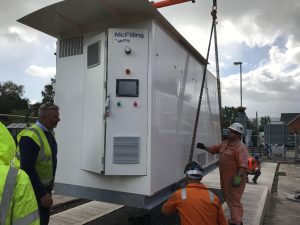I’ve written a number of blogs over the years about hydrogen fuel cell technologies, most recently just a couple of weeks ago. It’s a technology that is moving so fast that another blog on the matter is called for.
It is clear governments are not on track to meet the goals set by the Paris Climate Agreement. Progress on decarbonising the electricity sector is being made, but on transport, heating and cooling very little progress has been made. The transport sector may switch from fossil fuels to battery and hydrogen fuel cell electric vehicles very rapidly. If the technology is better, cheaper and cleaner it could be very rapid indeed. Hydrogen has several advantages over battery electric vehicles, especially where longer range or heavier vehicles are needed.
The World Hydrogen Council has quadrupled in size over the last eighteen months. Currently much of the hydrogen used in industry is derived from fossil fuels, but the World Hydrogen Council is envisaging a huge scaling up of hydrogen use at the same time as the switch to creating it all from renewable energy sources.
A year or two ago there was very little by way of hydrogen refuelling infrastructure. It is now being deployed at a great rate. Locally Riversimple and McPhy have just brought the first hydrogen refuelling station to Abergavenny, which is exciting for me as our car sharing club will be using this facility by next spring. Also this week ITM Power and Johnson Matthey have opened a public refuelling station in Swindon, ITM’s seventh such station in Britain. Air Liquide have just opened their tenth refuelling station in Germany. The big news however is from Nel ASA who have just opened a factory in Herning, Denmark, which will produce 300 hydrogen refuelling stations per year, initially I think mainly for deployment in Norway, Denmark, Germany and USA. They have been contracted to supply refuelling stations for the Nikola Motor Company, whose big hydrogen fuel cell trucks should be in production by 2021. South Korea expects to have a thousand hydrogen fuel cell buses on the road by 2022, with 310 refuelling stations. Norway plans to have a thousand hydrogen trucks in use by 2023. These are all encouragingly short timeframes.
Last week the world’s first hydrogen fuel cell train started operating in Germany. It was built by Alstom, who now plan to start production in UK. ABB and Ballard Power Systems are looking to a future where global shipping switches from diesel to hydrogen fuel cell technology. Bring it on. The planet is in need of a very rapid energy transition.

